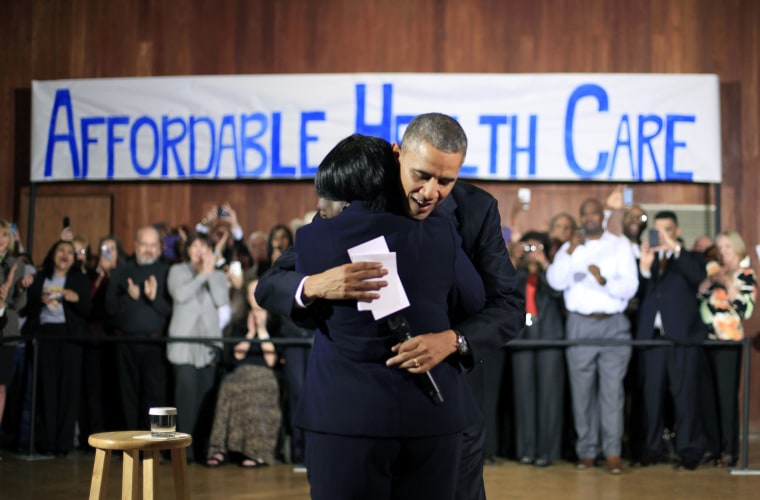As a rule, the Affordable Care Act is only considered front-page news when something has gone wrong. It's why Americans probably haven't heard much about "Obamacare" lately -- all of the news lately has been excellent.
Ezra Klein
reports today on President Obama's "signature accomplishment ... succeeding beyond all reasonable expectation."
A new report from the Kaiser Family Foundation finds that in seven major cities that have released data on 2015 premiums, the price of the benchmark Obamacare plan -- the second-cheapest silver plan, which the federal government uses to calculate subsidies -- is falling. Yes, falling. "Falling" is not a word that people associate with health-insurance premiums. They tend to rise as regularly as the morning sun. And, to be fair, the Kaiser Family Foundation is only looking at 16 cities in 15 states and the District of Columbia, and the drop they record is, on average, a modest 0.8 percent (though this is the same methodology they used in 2014, and to good results). But this data, though preliminary, is the best data we have -- and it shows that Obamacare is doing a better job holding down costs than anyone seriously predicted, including Kaiser's researchers.
Remember the Republican/media preoccupation with the "death spiral"? We now know, of course, that such speculation was wrong. But just as important, we should also appreciate the extent to which conservatives had it backwards -- the exact opposite of their predictions are coming true.
Paul Krugman
joked today that "we're actually seeing the opposite of a death spiral; call it a life spiral. For one thing, the huge surge in enrollments late in the day meant that the risk pool this year is better than insurers expected, and they now expect 2015 to be better still. Also, importantly, big enrollments mean that more insurers are entering the market, increasing competition. And, of course, the better the deal the more people will sign up: success feeds success."
It's against this backdrop that a growing number of Republican governors are
finally coming around on Medicaid expansion, as GOP candidates
scale back their anti-ACA campaign ads.
And this, in turn, leads to a couple of big-picture questions.
The first is, exactly how long can Republicans stick to the line that "Obamacare is failing" before people starting laughing out loud in their faces? Members of a serious governing party should, at this point, be asking themselves how they managed to be so spectacularly wrong about the health care debate.
The right didn't just flub obscure details about the ACA; Republicans, en masse, managed to get
literally every aspect of the policy fight wrong. That's actually a difficult task -- failing this badly on such an important issue isn't easy, but GOP lawmakers managed to pull it off.
And yet, stripped of any remaining shred of credibility, Republicans still
casually refer to the Affordable Care Act as a disastrous failure, not because the argument is any way rooted in reality, but basically out of habit.
But wait, the dead-enders caution, what about the Halbig ruling that threatens to destroy the entire ACA system? The D.C. Circuit did, in fact, issue a "
completely insane" ruling recently, which has been subsequently been
torn to shreds by fair-minded observers.
Indeed, we've arguably reached the point at which the D.C. Circuit's ruling is now more than just a misstep from conservative ideologues; it's also an embarrassment to conservative jurisprudence in general.
The latest big legal challenge to the Affordable Care Act—the one that could potentially deprive millions of people of subsidies, making it impossible for them to get insurance—just suffered a major setback in federal court. The Circuit Court of Appeals in Washington on Thursday announced that it is withdrawing its July decision, in which a two-to-one majority upheld the challenge, so that the full panel of active judges on the court can rehear the case. Federal appeals courts don't grant this sort of "en banc" rehearing very frequently. They do so only when the stakes of the case are big and when they think the initial decision is suspect. (It takes a majority of active judges to grant such a hearing.) "At a minimum, it signals discomfort from a majority of the Court with the [three-judge] panel's reasoning," says Nicholas Bagley, a University of Michigan law professor who has followed the case closely and written frequently about it.
I'm looking forward to the day when the political world looks back at the ACA debate as an amusing, years-long tantrum, thrown by lazy partisans, as many of us just shake our heads in disappointment with the misguided critics. It will be similar to the way we marvel at conservatives who said Medicare and Social Security would destroy civilization as we know it.
That day is on the horizon. It's a question of "when," not "if."
